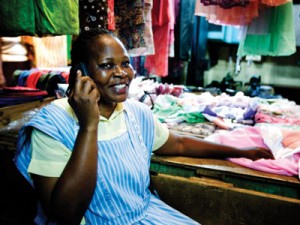Bridging the technology divide

Copyright: Wireless
Mobile digital technology could help deliver improved health, hygiene and education outcomes as well as economic progress in developing countries.
Researchers at Monash University are working on how information and communications technology (ICT) can used to alleviate poverty.
The work has been sparked by a massive spike in the uptake of mobile phones among the world’s poor.
Head of Monash’s School of Information technology in South Africa Dr Jacques Steyn says he and his team are working on how to tackle digital illiteracy and how to deliver things like health and farming knowledge to empower social and economic change.
“Technology helps us to communicate over geographical distances and across time boundaries,” he said.
“It makes knowledge exchange possible, which offers opportunities of empowerment,” Dr Steyn said.
“Just knowing that basic hygiene helps to avoid sickness improves quality of life. But knowledge like this is often absent among the poor.”
Researchers are still grappling with the social, geographical and logistical barriers to introducing technologies to remote regions – for instance, in Africa.
Modern information and communication technologies (ICTs) such as computers with internet access require digital skills and costly infrastructure.
But mobile usage has soared, particularly in Africa, with more than 90 per cent of the populations of Senegal, Ivory Coast and South Africa using mobiles.
In Ghana, Nigeria, Cameroon and Tanzania the figure is more than 80 per cent; and in Uganda and Kenya it is more than 70 per cent.
“There has been an amazing uptake of mobile phones among the world’s poor,” Dr Steyn said.
“The dominant use is for communication with family and friends. In itself, this constitutes a considerable success even if there is no clear economic benefit; it has made people’s lives easier but we are still far from using ICT for empowerment through knowledge,” he said.
Monash researchers are looking at practical ways of taking technological hardware and skills to the developing world.
They are testing and assessing systems designed specifically for the developing world and for remote indigenous communities.
But the use on digital technology in the developing world raises an ethical question perhaps best summed up by the phrase: “you can’t eat a computer”.
“When we think of technology, we think of computers, phones, programs designed for an affluent middle class,” said Monash Australia research fellow Dr Larry Stillman.
“But we’re talking about very poor, often AIDS afflicted communities without health, education or clean water.
“When we take these technologies into developing countries, there is a danger of overlaying our western expectations onto their usefulness as well as how they will actually be used. These moral concepts are important considerations,” he said.
Another question that arises around introducing digital technology to the developing world is the idea that a community may accept the technology but then be hampered by high rates of illiteracy among adults.
Monash researchers are addressing this by focusing on the next generation as children tend to be more able to teach themselves how to use a computer.
They are also looking at features within the technology that enable digital competency.
“People who cannot read can still learn how to use the icons on a phone. There are also voice recognition programs that could help,” Dr Stillman said.
“These are tools that can empower a person in a developing country, or groups of people together helping each other. One might be talking, the other typing – this is the African idea of ‘ubuntu’ – or kindness.
“And a mobile phone is a simple technology that can be charged from a car battery, shared by a family or even a village, and used with minimal training.
“It’s a slow process but if a rural community has better knowledge about how to manage their produce, about healthier living, about women’s rights or floods, we have helped them make the world a better place to live,” he said.












